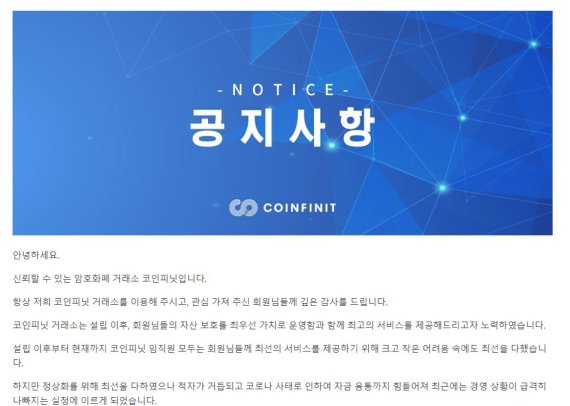
Virtual asset exchanges, which had sprang up until last year, continue to close. The amended ‘Specific Financial Transaction Information Act’ includes anti-money laundering (AML) obligation and report system of virtual asset service providers (VASPs). Small and medium-sized exchanges that did not achieve a breakthrough prior to the enforcement of this law would close their business.
The industry expects that the closure of small and medium-sized exchanges will lead the Korean virtual asset market to change.
■Closure of small and medium-sized exchanges

According to the industry on the 20th, small and medium-sized exchanges that suspended virtual asset trading services have increased this year. Since 4 major exchanges such as Upbit, Bithumb, Coinone, and Korbit occupy most of the Korean virtual asset market, small and medium-sized exchanges that have not seek a solution to survive are closing their business.
The requirements of the Act, including VASP licensing system, are the issuance of real-name verified virtual account and certification of an information security and management system (ISMS). Therefore, small and medium-sized exchanges which have determined that it is difficult to bear the cost of establishing and managing a security system to operate the business, choose to terminate the service.
Coinfinit will officially terminate its service on the 30th. The main reason was that it was hard to meet the requirements of the Act as the deficit operation continued due to the failure to secure the users.
Coinfinit said, “It is hard to meet the requirements of the Act under the circumstances where it is difficult to stabilize the service due to the deficit. We have concluded that it is hard to continuously provide the service.” “We had trouble financing and struggled for financial difficulties due to COVID-19,” they added.
Coinis, which applied for an injunction for prohibition on measure of business account transaction suspension against NH Nonghyup Bank in 2018, also suspended virtual asset trading services in February. Coinis said that it would inevitably suspend the service due to financial difficulties.
■Difficulties in exchange management
Coinzest, which has been suspending the withdrawal of KRW due to the financial difficulties since August last year, is open without any business. According to CoinMarketCap, virtual asset trading volume of Coinzest in the past month was 0 won. There is also criticism of operating system because Coinzest closed the KRW market and forced to convert the user’s KRW into a token of the exchange itself.
Coinplug’s own virtual asset exchange, CPDAX, has been gradually delisting virtual assets since the end of last year. Coinplug said, “The Act made it more difficult to manage the exchange because it would require operating the trading platform at a higher cost.”
An official at a blockchain security company said, “AML regulations required by Financial Action Task Force (FAFT) in June of last year include not only the system construction, but also customer due diligence (CDD) and enhanced due diligence (EDD) obligations, analysis of trade history, reporting to financial authorities, and cooperation with judicial agencies. “This will be reflected in the final Specific Financial Transaction Information Act after going through the enforcement ordinance procedure,” he added. He also said, “Small exchanges do not have enough capacity for security, so the number of exchanges that close the business before the Specific Financial Transaction Information Act is in effect will increase.”
Kim So-ra(2020.04.20) 중소 가상자산 거래소 ‘폐업’ 잇따라…특금법 시대 활로 못찾아
retrieved from https://www.fnnews.com/news/202004201338266039




![[November]Uptober No More](https://coinhubkorea.com/wp-content/uploads/2025/10/Whisk_d78880efb01a730907f4be201effefe1dr-1-100x70.jpeg)

